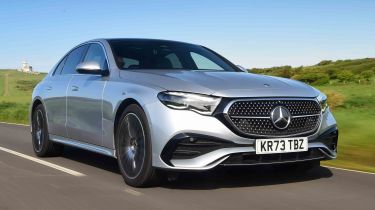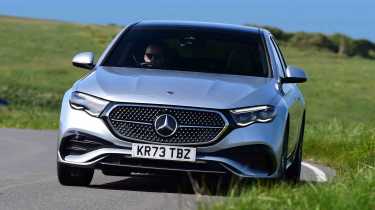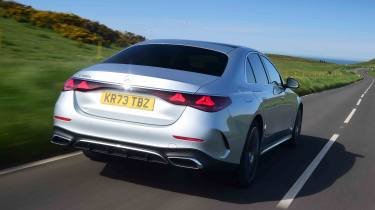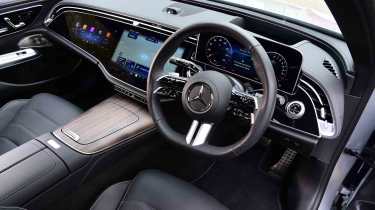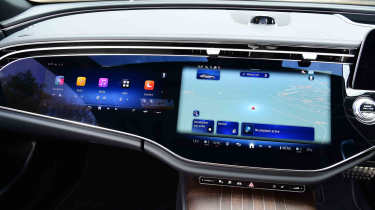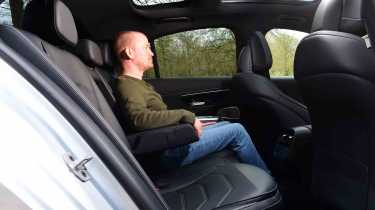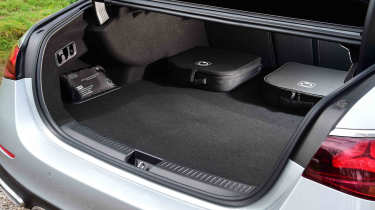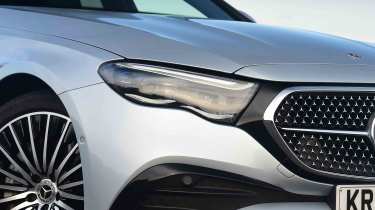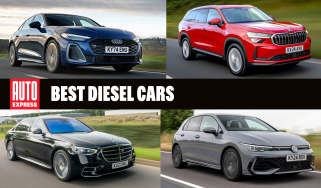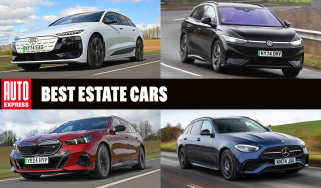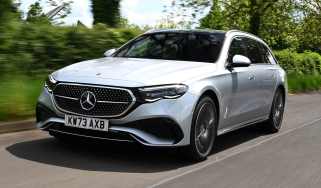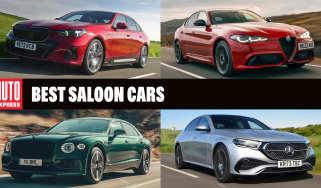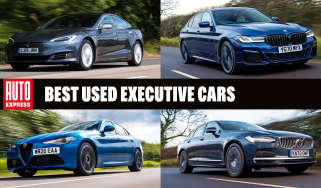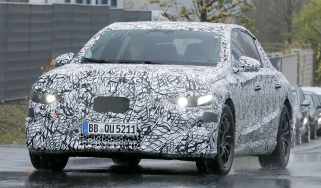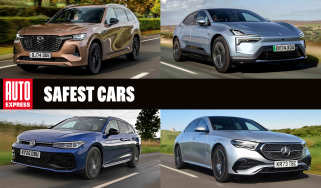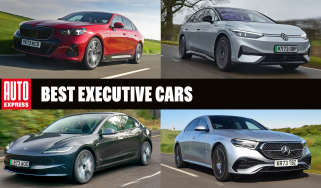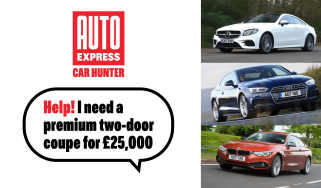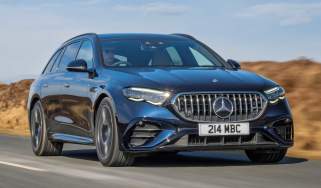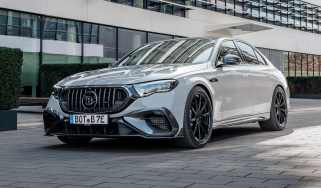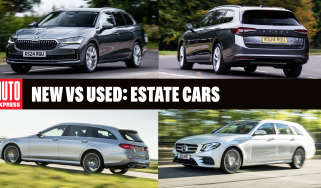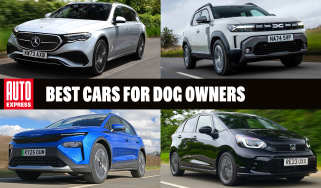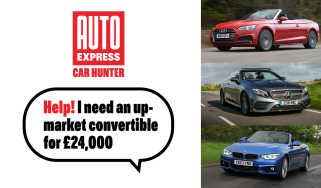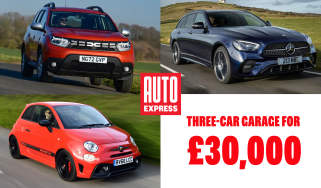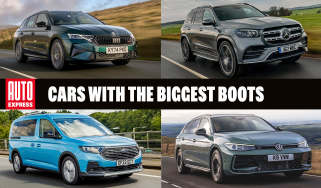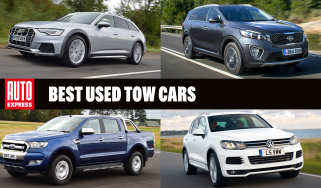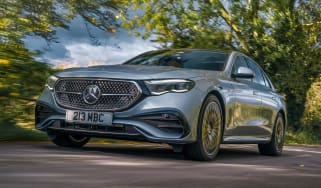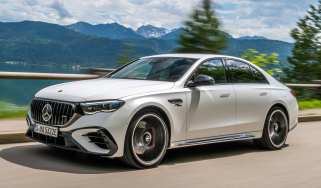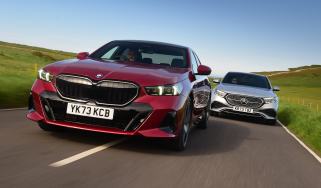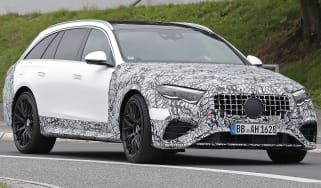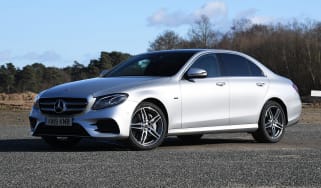Mercedes E-Class review
The Mercedes E-Class brings more tech than ever before, and it’s still a great long-distance cruiser

Our opinion on the Mercedes E-Class
The Mercedes E-Class is something of a lifeline for buyers needing a car that can travel huge distances in comfort and without having to stop often for fuel. The E 220 d diesel version isn’t as quiet as we’d like, but its impressive economy and respectable performance are perfect for a long trip, as are the plug-in hybrid models. The onboard tech is a high point, and the cabin is packed with screens and gadgets, especially when equipped with the Superscreen option. The plug-in hybrid versions lose out on boot space compared with rivals because their sizeable battery packs take up valuable luggage capacity. There’s an estate version available for those needing greater practicality, though.
About the Mercedes E-Class
The E-Class has been around for over 30 years in all manner of different forms and roles. It’s been a consummate executive express, a classy cargo haulier in the form of the estate (of which we have a dedicated Mercedes E-Class Estate review you can read following the link provided), a posh coupé, and even a wind-in-your-hair convertible. But it’s the regular saloon we’re concerned about here.
As per its predecessors, the E-Class goes up against the Audi A6 and BMW 5 Series, and is available in petrol, diesel and plug-in hybrid forms. There are also some high-performance AMG versions, although they now come in plug-in hybrid form instead of a fire-breathing turbocharged V8.
Used - available now

2020 Mercedes
E Class
68,686 milesAutomaticPetrol3.0L
Cash £23,511
2018 Mercedes
E Class
44,566 milesAutomaticPetrol2.0L
Cash £15,184
2020 Mercedes
E Class
41,681 milesAutomaticDiesel2.0L
Cash £25,923
2019 Mercedes
E Class
58,500 milesAutomaticDiesel2.0L
Cash £15,950We’ve driven the E-Class both at home and abroad, and even pitched it against its chief rival, the BMW 5 Series, in a twin test. The E-Class lost out to the 5 Series because we found it isn’t as good to drive, has an unforgivably small boot in plug-in hybrid form, and doesn’t have the most consistent brake pedal feel in plug-in hybrid form. We’re also not sold on its enormous screens, which not only can seem oppressive, but don’t give you a very interesting looking dashboard when everything is switched off.
Mercedes E-Class prices and latest deals
The Mercedes E-Class range is wide, spanning a starting price of around £56,500, all the way up to nearly £100,000 for the high-performance Mercedes-AMG E 53. The entry-level version is the E 200 petrol, although our favourite variant is the E 220 d diesel as it’s only slightly more expensive yet offers much better fuel economy.
If you’re considering a Mercedes as your next car, you can build a new Mercedes E-Class via the Auto Express Buy a Car service. You’ll also find a variety of both new and used E-Class deals.
Performance & driving experience
Pros |
|
Cons |
|
The engine range in the Mercedes E-Class begins with the E 200 petrol. It’s a mild-hybrid, four-cylinder motor with 201bhp (plus a little tiny electric helper motor as part of the mild-hybrid system). It’s also torquey with 320Nm on tap, so despite being the cheapest model, it’s still a good option for most people.
The E 220 d is a better fit for this type of car as it’s excellent for keeping fuel economy high while taking long motorway trips. It’s only a little less powerful than the petrol, with 194bhp, but it has more torque - 440Nm - so it feels a bit more muscular when you put your foot down.
The next rung up on the ladder is the E 300 e. It’s a plug-in rather than a mild-hybrid like the E 200 and E 220 d, using a four-cylinder petrol engine that’s mated to an electric motor to boost total power to 309bhp. Plus, you get 70 miles of driving on purely electric power, which is really impressive.
The E 300 de uses the same-sized battery, so the electric range is pretty much identical, and the total power is also the same at 309bhp. The only difference is that it uses a diesel engine, which will be more efficient than the petrol engine in the E 300 e.
The E 450 d is the most expensive non-AMG model in the E-Class range. The six-cylinder diesel engine has mild hybrid technology to provide some electrical assistance to improve fuel economy and emissions, and provide a small performance boost when accelerating. 362bhp gets to the ground through a standard four-wheel drive system.
At the top of the range is the Mercedes-AMG E 53 Hybrid 4Matic+. It’s the replacement for the old E 63 models but, controversially, does away with a thundering V8 engine for a six-cylinder petrol engine and an electric motor. The combined power output is 577bhp and 750Nm of torque, so it’s clearly a match for the old V8 when it comes to power, but car fans will probably miss the old car’s characterful engine and soundtrack.
All E-Class models use a nine-speed automatic gearbox, although the AMG model has different software that's tuned more for performance.
| Model | Power | 0-62mph | Top speed |
| Mercedes E 220 d | 194bhp | 7.6s | 148mph |
| Mercedes E 300 e | 309bhp | 6.4s | 147mph |
| Mercedes E 450 d | 362bhp | 4.8s | 155mph |
Performance, 0-60mph acceleration and top speed
The E-Class engine range has strong performance across the board. The E 200 petrol manages 0-62mph in 7.5 seconds, while the E 220 d does the same in 7.6 seconds. The top speeds of 149 and 148mph, respectively, reflect their home-country usage on the Autobahn; they’re great as high-speed cruisers despite being entry-level cars.
The E 450 d is the fastest non-hybrid in the range, and takes 4.8 seconds to go from 0-62mph. It can hit a limited top speed of 155mph.
The E 300 e and E 300 de are the economy-focused hybrids in the E-Class range, and can go from 0 to 62mph in 6.4 seconds. The petrol E 300 e has a top speed of 147mph, and the diesel E 300 de tops out at 146mph.
The high-performance Mercedes-AMG goes from 0-62mph in just four seconds and has a limited top speed of 155mph.
Town driving, visibility and parking
The Mercedes E-Class is a large car, so it will never be as relaxing to drive as a smaller city car through narrow streets. However, it’s incredibly quiet at low speeds, especially in hybrid models that can drive using near-silent electric power without waking the engine.
The suspension is fantastic at masking bumps and potholes, plus the automatic gearbox is smooth in traffic. So as long as you don’t need to park in a tight car park, the E-Class is excellent around town.
Country road driving and handling
The Mercedes E-Class is competent on twisty roads, but the BMW 5 Series is nicer to drive. The E-Class feels heavy, though. The brakes on plug-in hybrid models are effective, but they don't provide the same level of confidence as the 5 Series. There’s also an inconsistent pedal feel. The steering is numb - like many cars in this class - but light and quite quick, which can cause the car to feel a bit unsettled as you turn into bends.
There’s more body roll than a 5 Series in tight corners, but things improve once on an open A-road. The suspension in the E-Class smoothes out bumps very well (even in models with large alloy wheels and not much tyre sidewall). It does a fantastic job of providing a comfortable feel without jostling you and your passengers when travelling along a bumpy road.
Motorway driving and long-distance comfort
The E-Class excels on the motorway. Its smooth suspension and powerful engines make it effortless to spend time here, while the low-drag bodywork keeps wind noise low and economy high. The diesel engine in the E 220 d is a little noisy under hard acceleration, but overall refinement is superb, and we could hardly hear the engine in the E 300 e model we tested.
“The first thing that strikes you about the E-Class is just how well it rides – even on the huge 20-inch wheels of our test car. It glides over many bumps that cause a little fidget in the BMW.” - Alex Ingram, chief reviewer.
MPG & running costs
Pros |
|
Cons |
|
The plug-in hybrid E 300 e and E 300 de are the most economical models on paper, but don’t expect to get near the advertised WLTP fuel economy figures in the real world, especially if you’re driving with a flat battery. The plug-in models also have a smaller 50-litre fuel tank compared with the larger 66-litre tanks fitted to all non-plug-in petrol and diesel models.
The E-Class line-up is economical compared with rivals. We’d recommend going for the E 220 d because of its excellent 58.9mpg fuel economy, which is great for those who do a lot of motorway miles. The entry-level E 200 petrol provides a reasonable 43.5mpg, and is probably the better choice if you mainly do short trips and don’t need the company car tax savings of the plug-in models.
The most powerful model without full-hybrid assistance is the E 450 d, which returns 47.9mpg. With over 360bhp, it’s really fast and luxurious yet still manages to be pretty economical overall, if not quite at the level of the E 220 d.
The two diesel engines produce emissions ranging from 126g/km to 165g/km, while the petrol E 200 sits between the two with a 146g/km figure.
| Model | MPG | CO2 | Insurance group |
| E 220 d | 58.9mpg | 126g/km | 42 - 44 |
| E 200 | 43.5mpg | 146g/km | 41 - 44 |
| E 450 d | 47.9mpg | 165g/km | 50 |
Electric range, battery life and charge time
The Mercedes E-Class plug-in models have a stand-out electric driving range thanks to a large - by PHEV standards - 25.4kWh usable battery. This provides around 70 miles of range before the petrol or diesel engines in the E 300 e and E 300 de models are needed. There’s even a near 60-mile range in the high-performance AMG E 53 model, too.
The battery can be charged at a maximum rate of 55kW (60kW for the AMG E 53), which allows a 10-80 per cent top-up from a public charger capable of delivering such speeds in around 20 minutes. Most will prefer to charge at home using a cheaper overnight tariff, though. Using a typical 7.4kW wallbox charger, Mercedes quotes a 10-100 per cent charge to take three hours. Most other manufacturers quote a 0-100 per cent charge time, so we anticipate it’ll take around four hours to fully replenish a flat battery.
| Model | Battery size | Range | Insurance group |
| E 300 e | 25.4kWh usable | 70 miles | 50 |
| E 300 de | 25.4kWh usable | 67 miles | 50 |
| AMG E 53 Hybrid | 25.4kWh usable | 59 miles | 50 |
Insurance groups
Insurance groups in the E-Class go from 41 for the entry-level petrol model up to a maximum of 50 for the E 300 e, E 300 de, E 450 d, and high-performance AMG E 53 model. The BMW 5 Series will be cheaper to insure, because that starts in group 35 and goes up to group 44 for the quickest 550e plug-in hybrid version.
Tax
All versions of the E-Class are subject to the luxury car tax because all models cost over £40,000 when new. This means a surcharge will be added from the second time the vehicle is taxed until it is six years old. The plug-in hybrid models won’t cost as much to tax in the first year because they have lower emissions than their petrol and diesel counterparts.
Company car tax will be significantly lower for plug-in models than for regular petrol or diesel models. Choose the E 300 e, and you’ll be charged Benefit-in-Kind (BiK) at 5 per cent, while the E 300 de and AMG E 53 Hybrid models will be charged at 8 per cent.
Depreciation
According to our expert data, the Mercedes E-Class should hold on to more of its value than the BMW 5 Series, maintaining between 43 to 50 per cent of its original value after three years and 36,000 miles. The BMW, meanwhile, retains only 42 to 48 per cent after the same period.
To get an accurate valuation for a specific model, check out our free car valuation tool...
Interior, design & technology
Pros |
|
Cons |
|
The latest Mercedes E-Class isn’t a huge departure from the previous version in terms of exterior design, but Mercedes probably made the right call because it’s still a handsome, understated executive saloon. Under the skin, there’s loads of new tech.
All models have a 12.3-inch digital driver’s instrument cluster and a 14.4-inch central touchscreen. The example in the pictures has the optional MBUX Superscreen that covers the entire dash, providing the passenger with an additional 12.3-inch display to access apps or watch a movie. It means that where there was once high-quality upholstery and easy-to-use buttons, there’s now just a huge screen. Some may love that, while others may hate it.
Interior and dashboard design
The Mercedes E-Class still features excellent seats that are very comfortable and supportive, with all models including four-way electric lumbar adjustment. You will have to upgrade to the AMG Line Premium model to gain electric memory front seats.
All the basic equipment you could need is included as standard, including climate control, smartphone connectivity, keyless go, sat-nav with live traffic info, and artificial leather upholstery called Artico. A natural leather alternative is available, while plusher Nappa Leather is reserved for Exclusive Premium Plus models.
Materials and build quality
The standard of the materials you can see is very good, and the build quality is excellent. The screens take up a lot of space on the dash, and the centre console is quite high up, so you feel quite cocooned as the driver.
Infotainment, sat-nav and stereo
The Superscreen in the E-Class is the headline event for the interior of the car. It’s not on every model - the standard set-up is a 14.4-inch central touchscreen - but even on cars without, the dash is clearly designed to accommodate it and looks quite bare if it’s not there.
The Superscreen costs around £1,500, and although we’re not huge fans of it, models without it look a little odd, so we’d probably still order it. It completes the look of the cabin, and allows passengers to use their own screen for music and apps. The pack even contains a camera on top of the dashboard for video conferencing and selfies.
The Superscreen set-up supplements a central display of 14.4 inches with a 12.3-inch passenger display. The driver shouldn’t be able to see the passenger screen as it has a ‘visual shield’ for safety to prevent them from being distracted while driving. Smartphone connectivity is standard in all versions of the E-Class, so you’ve got Apple CarPlay and Android Auto as standard, even without the Superscreen option.
When we tested Mercedes’ MBUX infotainment tech as part of our infotainment head-to-head test, we were impressed with the sheer level of functionality on offer as well as the visual appearance of the graphics. However, we couldn’t help but feel a tad overwhelmed with the amount of information displayed in one go. Some of the shortcut toggles were also a bit tiny for our fingers. Overall, though, we calculated it as the second least-distracting system out of the ten that were tested.
“The cabin of the E-Class initially appears like one huge, daunting tech-fest, with a dashboard that is constructed entirely from screens. The huge panel doesn’t leave much scope for design flair, so it’s not quite as interesting to look at as the BMW’s interior.” - Alex Ingram, chief reviewer.
Boot space & practicality
Pros |
|
Cons |
|
The Mercedes E-Class comes with five seats, although the middle seat is only suitable for short trips. The outer seats are much more comfortable, and provide a little more legroom than its closest rival, the BMW 5 Series, although rear headroom could be better. Up front, the high centre console and supportive seats mean you feel enclosed as a driver and front passenger. Despite having a lower dashboard line than the electric Mercedes EQE, the E-Class doesn’t quite have as much forward visibility as the 5 Series.
Dimensions and size
The Mercedes E-Class is a big car at nearly 5m in length and 1.9m in width. However, being a saloon and not an SUV, it isn’t high off the ground, but it is nice and easy to get into.
It’s virtually the same size as its closest rival, the BMW 5 Series. There are a few millimetres of difference here and there, but if you’re considering one of these two cars, then you can be sure the other isn’t significantly bigger or smaller.
| Dimensions comparison | |||
| Model | Mercedes E-Class | BMW 5 Series | Audi A6 |
| Length | 4,949mm | 5,060mm | 4,999mm |
| Width | 1,880mm | 1,900mm | 2,099mm |
| Height | 1,480mm | 1,515mm | 1,470mm |
| Wheelbase | 2,960mm | 3,000mm | 2,932mm |
| Boot space | 370 to 540 litres | 520 litres | 354 to 492 litres |
Seats & passenger space
The front seats are comfortable and supportive, plus the driving position is very good too. It doesn’t feel hugely roomy up front thanks to the high centre console, but it’s a pleasant place to spend time, and we’d be happy to spend a whole day driving the E-Class on a long trip.
The latest Mercedes E-Class is a suitably big car and can take three across the back seat, although the middle passenger has to straddle a large central tunnel and a raised seating position, so they won’t want to be there for more than short trips.
Fortunately, the outer positions offer more legroom than those in a BMW 5 Series. Rear headroom isn’t quite so good due to the sloping roofline of the saloon, but you can solve this by opting for the Mercedes E-Class Estate version. You can fit a child’s car seat in the outer rear positions using the easily accessible Isofix mounting points behind some rubber covers.
Boot space
The petrol E 200 and diesel E 220 d and E 450 d models all have a spacious 540 litre boot. The narrower boot opening of a saloon body style means it’s harder to load taller items, but you can still fit a decent number of suitcases and bags in the back. If you need greater versatility, then you can always look at a Mercedes E-Class Estate instead.
However, the E 300 e, E 300 de and AMG E 53 models have a large battery pack on board, which reduces space down to a rather small 370 litres in the case of the high-performance AMG E 53 hybrid. That’s less than in a family hatchback like a Volkswagen Golf. What’s more, the plug-in models don’t have space below the boot floor for the charging cables, which means they have to live in a bag that takes up space in the already reduced luggage area. Not ideal for family holidays.
All versions come with a more versatile 40:20:40 split folding rear seat, so you can extend the luggage area if you need to carry longer items.
“While many would assume they need an SUV to tow a caravan, it transpires you really don’t because every version of the Mercedes E-Class can handle up to 2,100kg (braked), whether you go with the entry-level petrol, six-cylinder diesel, or plug-in hybrid.” – Max Adams, online reviews editor
Reliability & safety
Pros |
|
Cons |
|
While the E-Class hasn’t appeared in the Driver Power best cars to own rankings, the Mercedes brand has been striking the right chords with owners. With a second place finish out of 31 brands on the 2025 best manufacturer scoreboard, the three-pointed star only just fell short of Subaru to be number one. Mercedes owners were particularly impressed with their cars’ safety systems and infotainment tech.
Euro NCAP tested the E-Class in 2024 and gave it a five-star rating for safety. It scored 92 per cent in the Adult Occupant category and 90 per cent for children, plus an impressive 87 per cent score for safety tech. All results are superior to the 5 Series, making the E-Class a safe place to put your family.
The standard kit includes adaptive high beams, traffic sign assist, adaptive cruise control, parking assist, pedestrian protection and a reversing camera.
| Euro NCAP safety ratings | |
| Euro NCAP safety rating | Five stars (2024) |
| Adult occupant protection | 92% |
| Child occupant protection | 90% |
| Vulnerable road user protection | 84% |
| Safety assist | 87% |
Buying and owning
- Best buy: Mercedes E 220 d AMG Line Premium
While the PHEVs bring advantages for company car drivers, the diesel-powered E 220 d strikes a good balance between efficiency, performance and price. This variant is particularly beneficial for frequent long distance drivers, too, because it munches up the miles with ease.
Mercedes E-Class alternatives
As ever, the Mercedes E-Class is a direct rival for the Audi A6 and BMW 5 Series, as well as some left-field choices such as the Genesis G80. All are large executive cars and are aimed at wealthy private buyers and company car drivers looking for something ultra-comfortable, luxurious and still offers plenty of practicality and efficiency.
Within the Mercedes range, the E-Class sits between the smaller Mercedes C-Class and larger Mercedes S-Class saloon cars in terms of size and price. There’s also the E-Class’s electric counterpart, the Mercedes EQE, which is also a rival for the BMW i5 and Audi A6 e-tron.
Frequently Asked Questions
Mercedes offers a three-year unlimited mileage warranty on all of the brand’s new cars.
